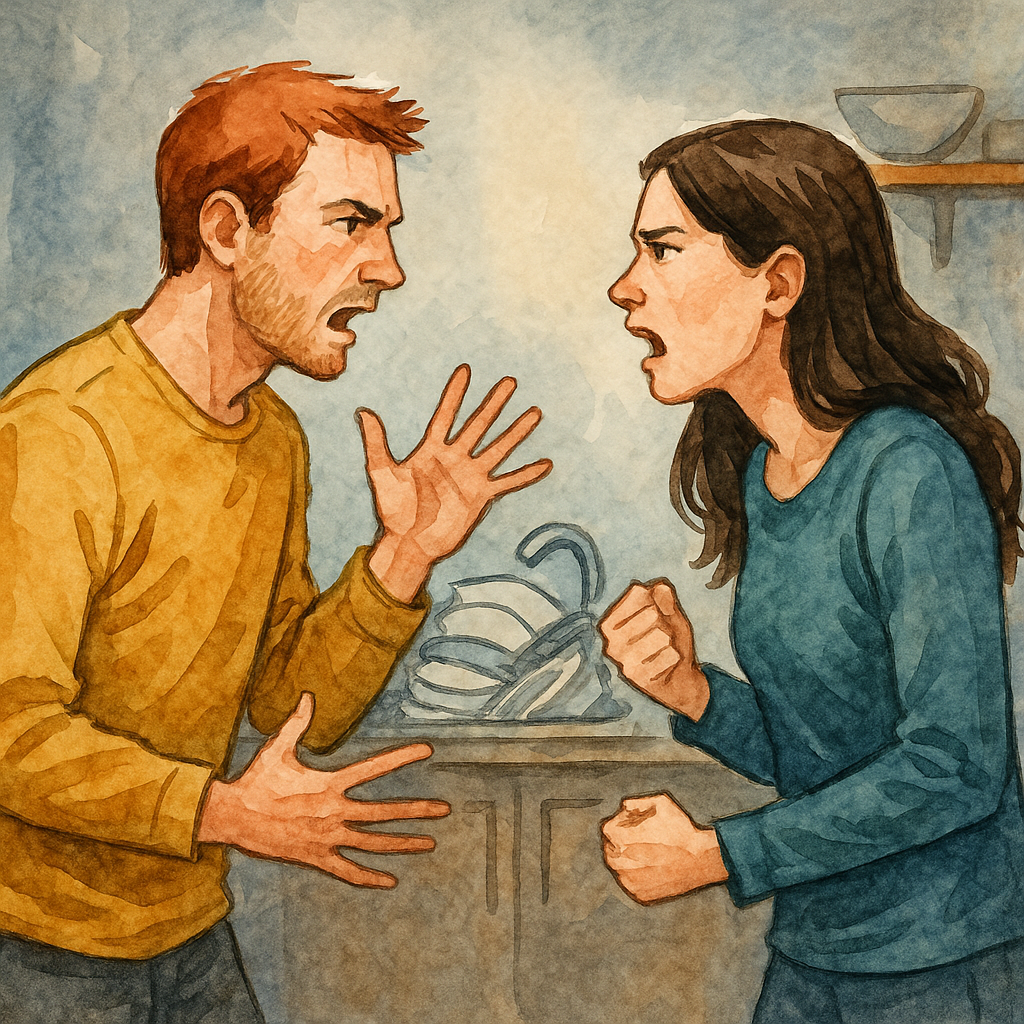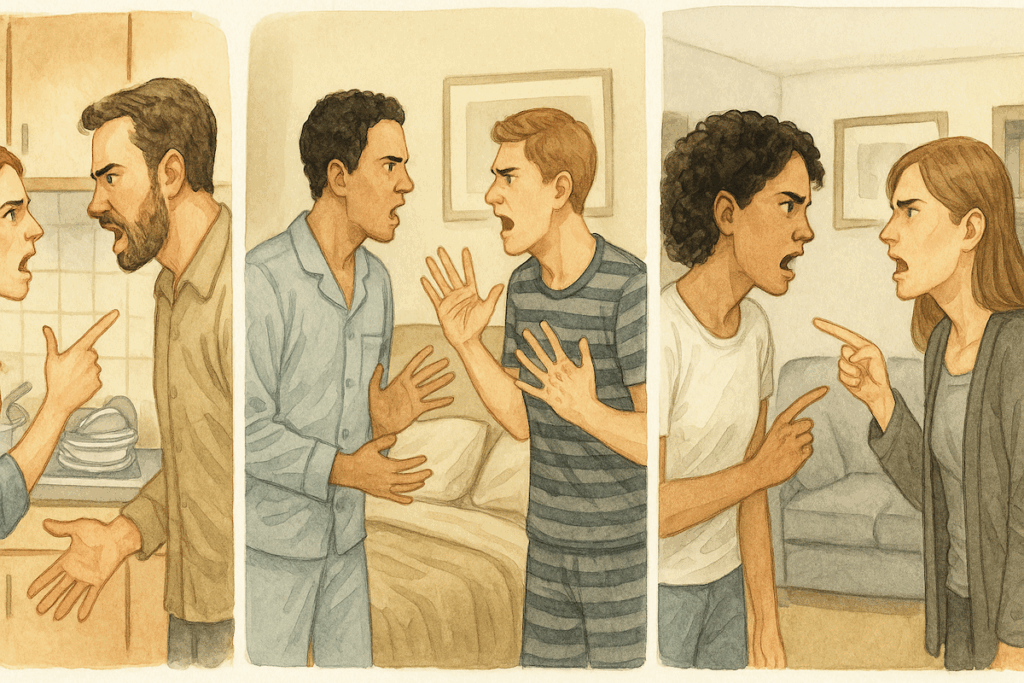And what it really means beneath the surface – what are couples conflict patterns
You probably already know how the fight begins. Maybe it’s something small—someone left the dishes in the sink again, someone forgot to text, someone didn’t listen properly. But before you even realise what’s happening, you’re both in it—frustrated, repeating the same lines, saying things you’ve said a hundred times before.
And then it ends the same way too: silence, withdrawal, or both of you walking away, wondering, “Why are we here again?”
If this sounds familiar, you’re not alone. One of the most common reasons couples seek help is because they’re stuck in repetitive arguments that never seem to get resolved. It’s not always about the issue at hand—it’s about the underlying patterns you’ve fallen into without even noticing.
And the truth is, most couples aren’t fighting about what they think they’re fighting about.
The Fight Beneath the Fight – The Couples Conflict Patterns
Let’s take a couple we’ll call James* and Nina*: They’ve been together for seven years, raising two children, managing demanding jobs, and trying to hold it all together.
Lately, they’ve been fighting about dinner routines—who cooks, who cleans, why things never feel “fair.” But under the surface, the real struggle is this: Nina feels invisible. She’s carrying the mental load and doesn’t feel acknowledged. James, on the other hand, feels like no matter what he does, it’s not enough. He’s exhausted from trying and feels like he’s constantly disappointing her.
So when they fight about “who’s doing the dishes,” it’s not about the dishes. It’s about feeling unseen, unheard, and unappreciated.

This is the pattern we see so often in couples therapy. The surface-level fight becomes a placeholder for something deeper—emotional needs that aren’t being met, often because both partners are stuck in their own cycle of defensiveness or withdrawal.
Why the Same Arguments Keep Coming Back
There’s a reason these loops are so hard to break.
Under stress, we tend to revert to our old emotional survival strategies. Some of us pursue—we ask more questions, get louder, or seek closeness. Others withdraw—we shut down, go quiet, or walk away. Both responses are often protective, shaped by past relationships, childhood experiences, or deeply held fears.
Let’s meet Aaron* and Mia*, another couple I’ve worked with (names and details changed). Aaron tends to shut down when things get tense. He needs space to process and regulate. Mia, on the other hand, craves immediate connection and clarity. When Aaron pulls away, Mia chases harder. The more she chases, the more overwhelmed Aaron feels—and so he withdraws further.
Sound familiar?
These cycles aren’t a sign your relationship is broken. They’re a sign your relationship is stuck.
It’s Not Just the Conflict—It’s the Pattern
The same argument will keep showing up in different forms until you learn to see the pattern and shift it together.
Most couples say, “We just need better communication.” And yes, that’s true—but what’s really needed is emotional safety, the ability to show up vulnerably and hear each other differently.
When you feel emotionally safe with your partner, you’re more likely to:
- Express feelings without blaming
- Listen without preparing your defence
- See past the surface issue to what your partner is actually needing
But emotional safety doesn’t just appear. It’s something that can be rebuilt—with support, structure, and new tools.
What We Do in Couples Therapy (and Why It Works)
In weekly couples counselling or in an intensive multi-hour format, the focus isn’t just on problem-solving. It’s about helping you both slow down the pattern, understand what’s really happening underneath, and begin to co-create a new rhythm in your relationship.
We’ll work together to:
- Identify your unique conflict cycle
- Explore how each partner experiences safety and stress
- Rebuild emotional connection through new kinds of conversations
- Practice skills that make communication feel less like a battle and more like a bridge
For some couples, weekly sessions provide the right amount of time to build slowly and reflect in between. Others benefit from a more immersive experience—a 3-hour session or a private retreat-style day, where we can dig deeper, faster, without being interrupted by the outside world.
You’re Not the Only Ones
One of the hardest things about being stuck in the same argument is that it starts to feel like there’s something wrong with you—or with your relationship.
But that’s not true. Most couples have these kinds of cycles. The key is learning how to recognise them not as signs of failure, but as invitations to grow.
Sometimes, we weren’t taught how to navigate conflict with care. We didn’t see it modelled. We don’t have the tools. And yet we’re expected to just “know” how to repair, forgive, reconnect, and stay emotionally available—even under stress.
The good news is: this can be learned.
What If Things Could Change?
Imagine if the next time an argument started, you could pause and say:
“Wait—I think we’re in our pattern again.”
And instead of spiralling, you could name what you’re really feeling.
And instead of shutting down or escalating, your partner knew how to respond in a way that helped you both feel more connected—not more alone.
That’s what we work toward in couples therapy. Not perfection—but repair. Not never fighting—but fighting better, and loving each other more clearly through it.
You Don’t Have to Do This Alone
If you and your partner are stuck in repetitive conflict, and you’re wondering whether anything can shift, reach out.
Whether through weekly sessions or an intensive multi-hour format, couples therapy offers a dedicated space for change. A place to understand yourselves, each other, and the way forward.
You don’t need to have it all figured out before reaching out. That’s what we’re here for.
NOTE: * The people in this blog (and also it’s illustrations) are fictional creations. Any similarly to real people is purely coincidental.

